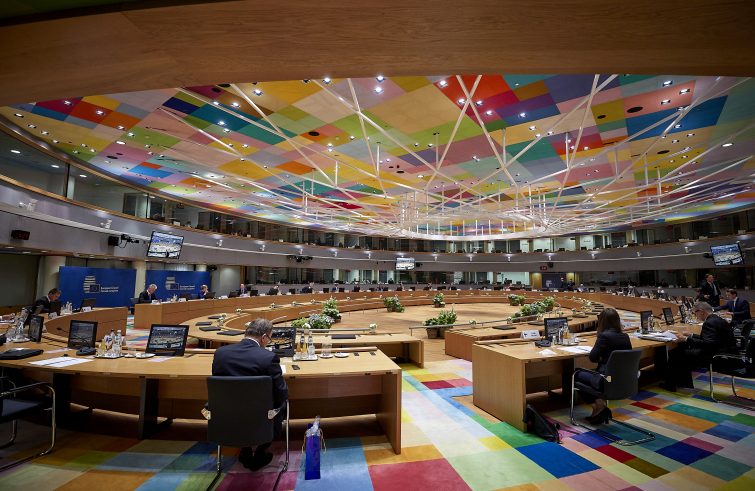
Charles Michel rubs his eyes, fixes his jacket and starts talking while the sun is rising in Brussels. After four days of arduous, occasionally desperate negotiations, in the early morning hours of Tuesday 21 July, the President of the European Council could finally say: “Hello, everyone. We did it. Europe is strong. Europe is united. Nous l’avons fait: l’Europe est solide, l’Europe est robuste et surtout l’Europe elle est rassemblée”.
Decisions and numbers. The Heads of State and Government, gathered in conclave in the Europa Palace since last Friday, reached an agreement on a €1,074 billion Multiannual Financial Framework (i.e. the EU budget for the period 2021-2027, now requiring the green light from the European Parliament) and on the Recovery Plan, i.e. the €750 billion fund to address the economic crisis triggered by the Covid-19 pandemic. The Plan includes €390 billion in grants and €360 billion in low-interest loans, secured on the markets through bonds, guaranteed by the MFF. The EU Commission will monitor spending, while the “emergency brake” instrument allows a Member State to have the EU verify that national programmes are progressing as agreed and that EU funds are not being squandered. On the whole, the EU is resolutely pursuing the path of “own resources”, which partly disengages it from national contributions and allows it to implement redistributive policy. This is a quantum leap in the history of the EU.
 “We must act quickly.” The “Conclusions”, i.e. the final, official document of the summit, consists of 69 pages in the English version. Italian Prime Minister Giuseppe Conte appeared to be the most satisfied with the outcome: “209 billion Euros give Italy the opportunity to restart with strength and change the face of the country. Now we must act quickly.” The proposed funding for Italy – the nation most affected by the epidemic in the health, economic and social sectors – makes its share of the Fund the largest, as it will have to be distributed according to a renewed solidarity principle. “We are satisfied with the approval of an ambitious relaunch plan, which will allow us to confront the crisis with strength and effectiveness,” Conte said during the press conference. “We obtained this result by protecting the dignity of our country and the independence of EU institutions”. The Italian PM went on with a domestic political message: “The Recovery Fund is the priority and I hope it will help divert the morbid attention surrounding the ESM” – the Euro rescue fund, opposed by part of the majority backing the Conte government.
“We must act quickly.” The “Conclusions”, i.e. the final, official document of the summit, consists of 69 pages in the English version. Italian Prime Minister Giuseppe Conte appeared to be the most satisfied with the outcome: “209 billion Euros give Italy the opportunity to restart with strength and change the face of the country. Now we must act quickly.” The proposed funding for Italy – the nation most affected by the epidemic in the health, economic and social sectors – makes its share of the Fund the largest, as it will have to be distributed according to a renewed solidarity principle. “We are satisfied with the approval of an ambitious relaunch plan, which will allow us to confront the crisis with strength and effectiveness,” Conte said during the press conference. “We obtained this result by protecting the dignity of our country and the independence of EU institutions”. The Italian PM went on with a domestic political message: “The Recovery Fund is the priority and I hope it will help divert the morbid attention surrounding the ESM” – the Euro rescue fund, opposed by part of the majority backing the Conte government.
 The role of “frugal States.” The most apt comment was made by EU Economy Commissioner Paolo Gentiloni: “Europe is stronger than its divisions.” Indeed, the divisions that came to the fore during the negotiations are certainly unlikely to disappear overnight. In fact, some countries that are virtuous on an economic and budgetary level – the so-called “frugal” countries, led by the Netherlands – are demanding rigour and reforms, pointing the finger at Mediterranean countries and in some cases Eastern Europe. Indeed, the need for reforms and a healthy budget should be duly acknowledged, especially in Italy. The fact remains that this is the time for solidarity, to restart European economy as a whole, for the benefit of all. This is what had to be explained to the Dutch Prime Minister, Mark Rutte, not without some difficulty. He finally conceded, obtaining in return a generous “discount” on the EU budget. The so-called “rebate” will also benefit Austria, Denmark and Sweden.
The role of “frugal States.” The most apt comment was made by EU Economy Commissioner Paolo Gentiloni: “Europe is stronger than its divisions.” Indeed, the divisions that came to the fore during the negotiations are certainly unlikely to disappear overnight. In fact, some countries that are virtuous on an economic and budgetary level – the so-called “frugal” countries, led by the Netherlands – are demanding rigour and reforms, pointing the finger at Mediterranean countries and in some cases Eastern Europe. Indeed, the need for reforms and a healthy budget should be duly acknowledged, especially in Italy. The fact remains that this is the time for solidarity, to restart European economy as a whole, for the benefit of all. This is what had to be explained to the Dutch Prime Minister, Mark Rutte, not without some difficulty. He finally conceded, obtaining in return a generous “discount” on the EU budget. The so-called “rebate” will also benefit Austria, Denmark and Sweden.
 New approach. In an effort to convince the Netherlands, backed by Austria, Denmark, Sweden and Finland, the credibility and economic-political strength of Chancellor Angela Merkel’s Germany and of President Emmanuel Macron’s France prevailed. Italian Prime Minister Conte, with the backing of his Spanish counterpart Pedro Sanchez, appeared overwhelmingly convincing and determined. The outcome was a “useful” Europe, probably necessary, albeit marked – once again – by inconclusive selfishness and short-sighted nationalism. Above all, a new approach to economic policy seems to emerge, whereby the common elements of the single market and the euro currency should be protected for the sake of shared common benefit in the EU and for Europe’s greater role in the global economy.
New approach. In an effort to convince the Netherlands, backed by Austria, Denmark, Sweden and Finland, the credibility and economic-political strength of Chancellor Angela Merkel’s Germany and of President Emmanuel Macron’s France prevailed. Italian Prime Minister Conte, with the backing of his Spanish counterpart Pedro Sanchez, appeared overwhelmingly convincing and determined. The outcome was a “useful” Europe, probably necessary, albeit marked – once again – by inconclusive selfishness and short-sighted nationalism. Above all, a new approach to economic policy seems to emerge, whereby the common elements of the single market and the euro currency should be protected for the sake of shared common benefit in the EU and for Europe’s greater role in the global economy.
Democracy and the rule of law. Moreover, it should also be noted that funds will be distributed and utilized conditional on respect for democracy and rule of law, which lay at the heart of the European project. This point was attacked by Hungarian Prime Minister Viktor Orban. Indeed, this aspect is crucial to reaffirming that the EU is not only an economic edifice, but – as it is called – a “community of values.”
 Political timeframe. The duration of the meeting has also been noted. But it further confirms that politics needs time and patience to discuss different and sometimes opposing positions, to strike a better deal, not to give in to the logic of “let Samson die with the Philistines”, finally achieving a result that holds together good governance and reforms. The recently concluded European Council will go down in history both for the creation of the Recovery Fund (Next Generation Eu) and for the way in which The Netherlands’ Rutte stood up to the “big States”. This shows that every country has equal dignity and the right to speak, and this is a cornerstone of the European Union. But another important point is the need to overcome the veto right, according to which a state or a block of countries (in this case with less than a tenth of EU population) can hinder decisions on economic or foreign policy. The Conference on the Future of Europe, scheduled for next fall, should once again include this anti-historical inconsistency on its agenda.
Political timeframe. The duration of the meeting has also been noted. But it further confirms that politics needs time and patience to discuss different and sometimes opposing positions, to strike a better deal, not to give in to the logic of “let Samson die with the Philistines”, finally achieving a result that holds together good governance and reforms. The recently concluded European Council will go down in history both for the creation of the Recovery Fund (Next Generation Eu) and for the way in which The Netherlands’ Rutte stood up to the “big States”. This shows that every country has equal dignity and the right to speak, and this is a cornerstone of the European Union. But another important point is the need to overcome the veto right, according to which a state or a block of countries (in this case with less than a tenth of EU population) can hinder decisions on economic or foreign policy. The Conference on the Future of Europe, scheduled for next fall, should once again include this anti-historical inconsistency on its agenda.
A new opportunity. Now that the spotlight on the summit has been dimmed, all the involved parties will have to make this useful, albeit imperfect, agreement a concrete reality in their respective countries, working towards a range of measures to support businesses, markets, workers and families, focusing, inter alia, on innovation, digital revolution and sustainable economy. This is the time to take action, to spend without squandering. Once again Italy is given an opportunity that must not be missed.











